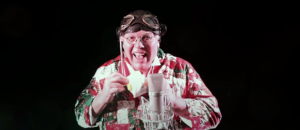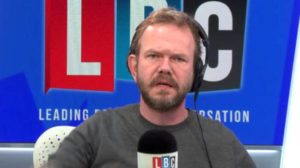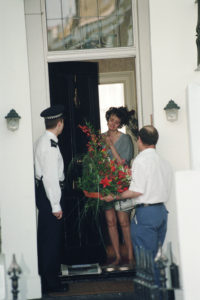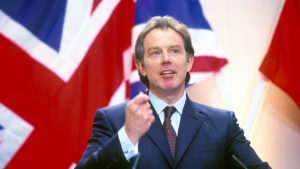In a properly ordered universe, there would have been a general election in the autumn of 1994. Certainly the country was ready for change. After 15 years in power, the Conservatives were exhausted, divided and lacking the will to govern. Labour, led since July by the youthful Tony Blair, had a 30-point lead in the polls.
There was a new mood in Britain, evident in the buoyant state of popular culture. It was the year of Parklife and Definitely Maybe; of Four Weddings and a Funeral, The Madness of King George and Shallow Grave; the year when Antony Gormley won the Turner Prize, and when the National Lottery and Loaded magazine were launched; when Harry Enfield’s TV show moved from BBC Two to BBC One, while Paul Merton became the first alternative comedian with a residency at the London Palladium.
Cool Britannia (though the term was not yet being used) was already having it large, and over the next couple of years, Blair clung to its Union Jack coattails. “I am part of the rock and roll generation,” he explained, rather too earnestly, as he made his triumphal tour of awards ceremonies.
By the time he got into power in May 1997, though, it was all pretty much over and done with. The frothy, showy optimism of Cool Britannia was not to be the cultural tone of the New Labour years. It seemed appropriate that Radiohead’s OK Computer was released that month, a much darker, more unsettling vision of modern life than Britpop had offered. More significant yet — though few could have guessed it — Swedish television was airing the first episode of a series called Expedition Robinson.
This was a show developed by British company Planet 24. They’d earlier given us The Big Breakfast and The Word, but this was a very different proposition. This was a game show in which a group of strangers were put on a remote Malaysian island, given tasks to complete, and asked to vote on which of the other contestants should be eliminated from the competition. In its English-language versions, the franchise was to be called Survivor, but the Swedish incarnation was the first to reach the screen, and can therefore claim to be the foundation stone of what would become known as reality TV. And that was the cultural trend that would dominate the Blair years.
The point of reality TV was not that it recorded normal life — as had docusoaps such as Airport or Driving School — but that it invented an environment and dropped people into it, poking them with sticks to see how they’d respond and encouraging them to gang up on each other. “It’s life as a game show,” enthused Granada Television’s controller of entertainment.
In this world, normality was not rewarded, the trick was to distort one’s own reality into attention-winning caricature. This was particularly so after the arrival of Big Brother in 2000, which allowed viewers to play Caesar, deciding who should survive and who be banished. The star of the first series of Big Brother was “Nasty” Nick Bateman; his exposure as a devious manipulator of his housemates gave Channel 4 its best ratings since it premiered Four Weddings and a Funeral.
The influence of reality TV spread rapidly. Unable to compete with the prize money on offer in ITV’s quiz show Who Wants to Be a Millionaire?, the BBC came up with The Weakest Link in 2000. The sums won were mundane, and instead the selling point was a ruthlessness new to British quizzes; the contestants voted each other off, while the aggressive presenter Anne Robinson abused them for their stupidity, their clothes, their lifestyle choices. It was a “theatre of cruelty”, said Magnus Magnusson, the recently retired host of Mastermind, who came from a kinder era of television. The show’s catchphrase was Robinson’s dismissive “You are the weakest link. Goodbye.” What she really meant, said Magnusson, was: “Goodbye! You’re getting bugger all! Fuck off!”
The press called Robinson “the rudest woman in Britain”, and reported that she was the second-highest paid TV presenter in the country. (Only David Starkey, himself never knowingly polite, was said to earn more.) She insisted that the contestants willingly entered into the bantering spirit of the game. “I’ve never had a complaint from them, only the critics,” she protested. But that rather missed the point of the criticism: that the style of the show was inherently antisocial. “The inference is that it’s incredibly funny to belittle people,” wrote veteran Daily Mail columnist Lynda Lee-Potter. “In fact, it’s the hallmark of the bully and the sadist, and it ruins lives.”
In the same way, it didn’t matter much whether David Cameron minded being asked by Jonathan Ross about his teenage years: “Did you or did you not have a wank thinking about Thatcher?” What mattered was the decline of decency in light entertainment, and in the treatment of politicians.
There was a certain nastiness, a cold cruelty, that was becoming evident in culture. The new stars of comedy were those such as Jimmy Carr and Frankie Boyle, causing tabloid outrage with bad-taste jokes. Or there was sketch show Little Britain, with its blackface and its fat-suits, its skits on vomiting, incontinence and gerontophilia. The most recognisable creation here was Vicky Pollard, the chav schoolgirl who gets pregnant and swaps her baby for a Westlife CD. Similarly the character who made the most impact in The Catherine Tate Show was another chav schoolgirl, Lauren Cooper, with her catchphrase “Am I bovvered?” Mocking the working class seemed funnier now than it had back in the days of Cool Britannia, when Pulp had sung Common People.
“Bovvered” was named the Oxford Dictionaries Word of the Year in 2006, and the following year Tony Blair played opposite Lauren in a Comic Relief sketch, giving a pitch-perfect performance. “He is one of the finest comic actors of his generation,” gushed Tate, which was overstating the case, but certainly no leading politician had ever engaged so convincingly with popular culture. Nonetheless, it didn’t feel entirely comfortable, coming from a Labour prime minister. It was only a short step from Vicky Pollard and Lauren Cooper to the real-life ridiculing of working-class participants on The Jeremy Kyle Show, Fat Families and Benefits Street. (Frankie Boyle suggested the Jeremy Kyle audience was recruited “by firing tranquilliser darts into Primark”.)
If television was becoming harsher and more coarse, that development was perhaps being driven by the emergence of a rival medium, the first serious challenge TV had faced since its rise to cultural dominance half-a-century earlier. The internet, even in its early, pre-social media days (MySpace and LinkedIn launched in 2003), was already a noisy, demanding presence. Unregulated and chaotic, it could ignore all standards of decency and taste — not just the restrictions imposed on television, but the values at the very core of society.
Far more extreme pornography was easily accessible online then than it is now. Amongst the ugliest was “crush fetishism”, a genre of sadistic videos that showed women in high heels trampling to death small animals, from worms and fish to hamsters and kittens. This came to wider public attention in 2002 when one of the leading practitioners, Tracey Seward, aka Stiletto, was given a life sentence at Manchester Crown Court for murdering her (human) partner.
More generally, animals didn’t come well out of reality TV. The RSPCA objected to a pig being slaughtered on Shipwrecked, to the neglect of chickens in the Big Brother house, and to Rebecca Loos masturbating a pig on The Farm. (“It was horrible,” complained one viewer of this latter episode. “I could barely watch.”) It also stopped the airing of a British version of American show Man vs Beast.
Partly the concern was about dignity — that of the viewers as well as of the animals — but there was also a suggestion that there had been a rise in incidents of domestic animals being abused and tortured. RSPCA head, and former Lib Dem MP, Jackie Ballard said: “People are becoming de-sensitised after seeing stars eat live insects and kill chickens on shows like I’m a Celebrity.”
And beyond even that, there was a fear that, as the case of Tracey Seward had shown, those who abuse animals will not necessarily stop at animals. There was to be a good deal of horrified outrage when a man killed himself in 2019 after appearing on The Jeremy Kyle Show, and the series was immediately cancelled. But it’s also worth remembering that the first person to be voted off Expedition Robinson, way back in May 1997, didn’t live to see the broadcast. He had already committed suicide.
There was, in short, a dark undercurrent to the culture of the time. By the time Jade Goody died at the age of just 27 in 2009, she had been canonised by the media, and the Prime Minister and the Archbishop of Canterbury were among those paying tribute, but it was hard to forget the crowds outside the Big Brother house in 2002, with banners saying “Jade, go to Hell” and “Slaughter the Pig”. “Don’t feel sorry for her,” urged the Sun’s showbiz editor. Or, as Germaine Greer was reported to have said in the Newsnight green room: “That fat slag deserves all she gets.” The Two Minutes Hate predated social media.
When he became Prime Minister in 1990, John Major had promised to build “a country at ease with itself”, and Tony Blair — as so often — followed in his path. But the casual cruelty, the mob mentality evident in the reality TV era implied that we were maybe drifting in the opposite direction. The raucous, disruptive tone was all a far cry from the world of mainstream politics, increasingly populated by nice, shiny interchangeable young men in bland suits. And when politics and popular culture drift out of alignment, it tends to indicate a coming fracture.
“More people have voted in recent Big Brother polls than voted in the European elections,” observed Charles Kennedy, and while that wasn’t actually true (more votes, yes, but not more voters), it was shocking that in the 2004 elections to the European Parliament the incumbent government could attract the support of just 8.5% of the electorate. Voters were becoming disengaged. On the other hand, so reality TV seemed to indicate, if people felt that their verdict would actually count for something, they were more willing to participate.
So it proved come the 2016 referendum, when turnout returned to the level of general elections in the Eighties. The era of reality TV was passed now, gone the way of Cool Britannia, but the cruelty remained, directed increasingly at those shiny, young men: David Cameron, the “heir to Blair”, was voted out of the house and found himself a washed-up has-been before his 50th birthday. Big Brother contestants were given a clear warning by producers at the outset: “We tell them they will become the most hated people in Britain, they will never get a job, they will never be taken seriously again and won’t make any money out of it.” Apart from that last bit, the same was now true of politicians.
Disclaimer
Some of the posts we share are controversial and we do not necessarily agree with them in the whole extend. Sometimes we agree with the content or part of it but we do not agree with the narration or language. Nevertheless we find them somehow interesting, valuable and/or informative or we share them, because we strongly believe in freedom of speech, free press and journalism. We strongly encourage you to have a critical approach to all the content, do your own research and analysis to build your own opinion.
We would be glad to have your feedback.
Source: UnHerd Read the original article here: https://unherd.com





